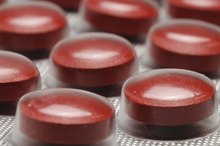What does fact checked mean?
At Healthfully, we strive to deliver objective content that is accurate and up-to-date. Our team periodically reviews articles in order to ensure content quality. The sources cited below consist of evidence from peer-reviewed journals, prominent medical organizations, academic associations, and government data.
- U.S. National Library of Medicine: PubMed Health - Levothyroxine
- U.S. National Library of Medicine: PubMed Health - Levothyroxine
The information contained on this site is for informational purposes only, and should not be used as a substitute for the advice of a professional health care provider. Please check with the appropriate physician regarding health questions and concerns. Although we strive to deliver accurate and up-to-date information, no guarantee to that effect is made.
Iron Supplements & Levothyroxine
Levothyroxine is a commonly prescribed thyroid medication. Iron in tablet form is useful for those who require extra iron as a supplement to their diet. You can take both an iron supplement and levothyroxine as long as you follow dosing recommendations. A regular routine for taking your medications and supplements will maximize your body’s ability to absorb them.
Levothyroxine
Levothyroxine, sold under such brand names as Synthroid, Levoxyl and Unithroid, is chemically identical to the hormone produced naturally by the thyroid gland, which is responsible for regulating the body’s metabolism. Doctors prescribe levothyroxine to patients whose thyroids produce insufficient amounts of the hormone. Individuals who have had their thyroid gland removed surgically because of cancer or another disease also require this drug to replace the hormones their bodies can no longer produce. Levothyroxine usually must be taken every day, as long as you live.
- Levothyroxine, sold under such brand names as Synthroid, Levoxyl and Unithroid, is chemically identical to the hormone produced naturally by the thyroid gland, which is responsible for regulating the body’s metabolism.
- Doctors prescribe levothyroxine to patients whose thyroids produce insufficient amounts of the hormone.
Iron Supplements
How Long Does Iron Stay in Your System?
Learn More
Iron is an essential nutrient that allows your red blood cells to carry oxygen throughout the body. Iron is found in meats, fish, legumes and whole grains. Individuals who lack sufficient amounts of iron can develop iron deficiency anemia, causing them to become weak and easily fatigued. Young women of reproductive age, pregnant women and young children are most susceptible to developing anemia. Many commercial breads and cereals are fortified with iron. Ferrous sulfate is the most common dietary iron supplement, It is available as a stand-alone supplement and in multivitamins for children and adults. Other forms include ferrous fumarate, ferrous succinate and ferrous gluconate.
- Iron is an essential nutrient that allows your red blood cells to carry oxygen throughout the body.
- Individuals who lack sufficient amounts of iron can develop iron deficiency anemia, causing them to become weak and easily fatigued.
Recommendations for Levothyroxine Use
Because levothyroxine must be taken on an empty stomach, physicians generally recommend that patients take it first thing in the morning, and wait 30 to 60 minutes before eating or drinking anything other than water. To avoid the danger of choking or gagging, swallow a full 8-oz. glass of water with the pill. Iron can compromise the absorption of levothyroxine. For this reason, take your iron supplement either 4 hours before or after taking the drug.
- Because levothyroxine must be taken on an empty stomach, physicians generally recommend that patients take it first thing in the morning, and wait 30 to 60 minutes before eating or drinking anything other than water.
- Iron can compromise the absorption of levothyroxine.
Recommendations for Iron Use
Can Iron Supplements Be Taken Safely With Adderall?
Learn More
The recommended dietary allowance of iron for men ages 19 and up is 8 mg daily. Women over age 51 also require 8 mg daily. During their childbearing years, however, women require an increased amount -- 18 mg daily. Pregnant women require 27 mg daily. Don't give iron supplements to an infant or child except under the direction of a physician. Too much iron can cause serious side effects.
- The recommended dietary allowance of iron for men ages 19 and up is 8 mg daily.
Related Articles
References
- Tolkien Z, Stecher L, Mander AP, Pereira DI, Powell JJ. Ferrous sulfate supplementation causes significant gastrointestinal side-effects in adults: a systematic review and meta-analysis. PLoS One. 2015;10(2):e0117383. doi:10.1371/journal.pone.0117383
- https://www.who.int/elena/titles/guidance_summaries/daily_iron_pregnancy/en/
- National Institutes of Health Office of Dietary Supplements. Iron Fact Sheet for Consumers. Updated December 10, 2019.
Writer Bio
Gwen Bruno has been a full-time freelance writer since 2009, with her gardening-related articles appearing on DavesGarden. She is a former teacher and librarian, and she holds a bachelor's degree in education from Augustana College and master's degrees in education and library science from North Park University and the University of Wisconsin.









